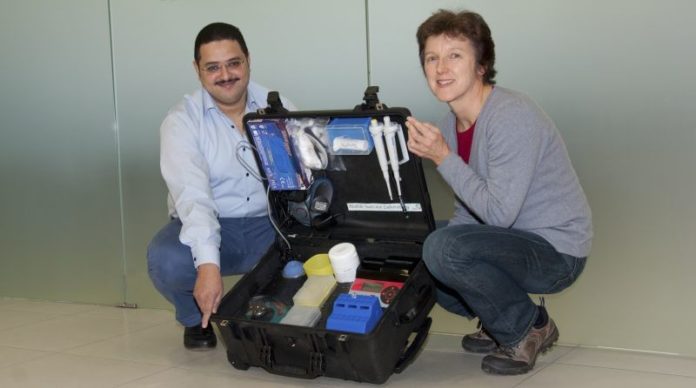
No electricity, no reliable cold chain, no diagnostic equipment available — scientists in field laboratories who diagnose and deal with Ebola infections often work under challenging conditions. Researchers at the DPZ have developed Diagnostics-in-a-Suitcase, which contains all reagents and equipment to detect the Ebola virus within 15 minutes at point-of-need. Moreover, the mobile suitcase laboratory will be operated by an integrated solar panel and a power pack. The mobile suitcase laboratory will enter a field trial in Guinea in collaboration with the Institut Pasteur de Dakar, Senegal, the Public Health Institute of Guinea, the University of Stirling, Robert Koch Institute, and TwistDx Ltd. Dr. Ahmed Abd El Wahed, scientist in the Unit of Infection Models at the DPZ, is the innovator of the suitcase laboratory. He will assemble five suitcases, which will be used at the Ebola treatment Centres in Guinea during the current outbreak.
Current tests rely on the detection of Ebola genome by the real-time polymerase chain reaction (PCR) technique which is not suitable for on-site screening. Samples collected from the site of an outbreak are therefore transported over long distances to laboratories for testing. Recently, criminals have stolen a motor vehicle, which transported infected material. The fear is that this might cause a wider spread of the virus if the material is used for political motives. The Diagnostics-in-a-Suitcase will prevent this by allowing the detection of the Ebola virus at the point-of-need (not only in rural areas, but also at airports or quarantine stations). The Diagnostics-in-a-Suitcase is based on the Recombinase Polymerase Amplification (RPA) technology developed by TwistDx Ltd, a subsidiary of Alere Inc. RPA is as sensitive as PCR, but extremely rapid and works at a constant temperature, meaning no rapid heat-cycling equipment is required. Furthermore, reagents used in the RPA test are cold chain independent, which allows them to be used and transported at ambient temperature.
“The early detection of Ebola infected patients will lead to a more effective virus control since medical staff can identify and isolate confirmed Ebola cases more rapidly ,” said Dr. Christiane Stahl-Hennig, the Head of the Unit of Infection Models.
“In remote field hospitals, resources such as electricity and cold storage are often in short supply.,” added Dr. Ahmed Abd El Wahed, “The Diagnostics-in-a-Suitcase will therefore contribute to a better management during the Ebola-outbreak.” From 216 applications, this project was one of six selected for funding by the British Enhancing Learning and Research for Humanitarian Assistance (ELRHA) hosted by Save the Children Fund as part of the Research for Health in Humanitarian Crisis (R2HC) programme.
Story Source:
The above story is based on materials provided by German Primate Center. Note: Materials may be edited for content and length.
